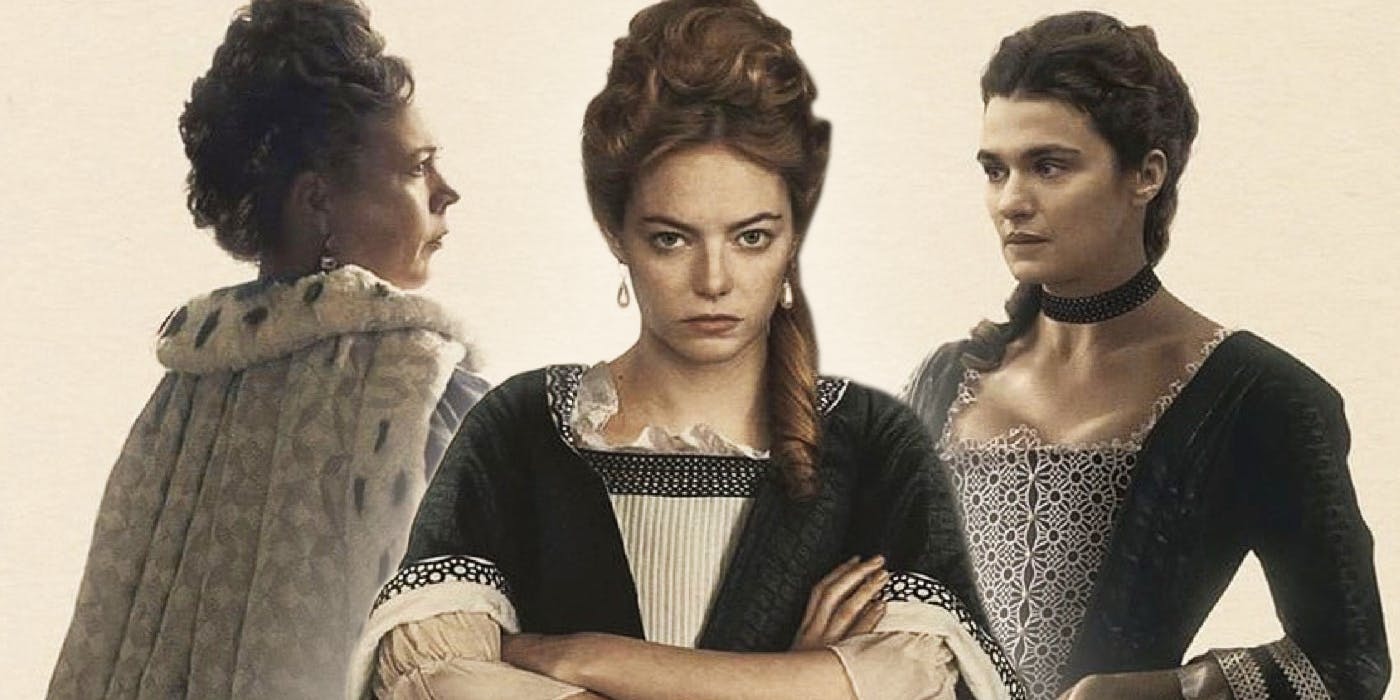By Chilimovie - 23 July 2021

Undoubtedly, "The Favourite" is extremely entertaining, but it is still very "Lance Moss". The movie goes back in time to Britain in the 18th century. The story is taken from a real event between the Duchess Sarah Churchill and Queen Anne. What's peculiar is that, unlike most orthodox British court dramas, the primitive etiquette and political laws of the upper class have been reduced to the margins, and the movie is replaced by the strange and absurd love triangle under the power system structure. Absurdity is Lance Moss' first consideration in constructing the character's survival system. Sartre wrote in "Nausea": "There is enough." Lance Moss uses a large number of wide-angle lenses, fisheye lenses, and low-angle upside-down shots to create a grotesque, alienated atmosphere, thereby staying in a semi-closed state. To create endless distorted space, to put it bluntly, is an attempt to expose the "living" through the surplus of "existence" in vain. Abigail's constant falls, Queen Anne's constant emotional riots, and the abnormal games in the court all told the absurdity and boringness of "existence".
The film revolves around the closed power struggle group composed of Queen Anne, the Duchess of Marlborough, and Abigail. On the surface, it is talking about the triangulation. In fact, it is not only insinuating the fragility of the state of existence, but also praising its absurdity. Queen Anne holds great power, but she can't escape her weakness: her dependence on Sarah. Her love for Sarah is vigorous and extreme, even at the expense of "transfer of power" in exchange for Sarah's control. But such people are often miserable, because love is not free, and Sarah's love for Queen Anne is extremely unreliable. Power has become the conversion condition of love. Even if the queen is willful, but in essence, it coincides with Sartre's "This kind of freedom is a bit like death". No matter how strong the love is, the individual's survival is still bloated, decayed, and parting. Fettered. When too many people habitually use "love" to point out the so-called "way out" for survival, Lans Moss held high the banner of existentialism, let the individual return to existence itself, and pointed out the fighting style of survival in the face of trapped beasts. State, the search for salvation itself is futile. He is tirelessly giving meaningless actions and language new meanings, and imposing his personal will on vain existences, in order to explore unique ways of survival.
Using the deep meaning of self-will can be understood as "resistance." Obviously Lansmos inherited Camus's ideas. When Abigail appeared, it exacerbated the sense of imbalance and heaviness of existence, and made this battle against loneliness and illusion more intense. This ruthless character was given a tragic fate from the beginning. It was only after Abigail declared his sovereignty through a precise burst in the shooting confrontation with Sarah, we only smelled Abigail's cruelty. . This kind of viciousness is given the meaning of resistance by Lansmos: a woman who attempts to break through her own tragedy has the resilience of life itself. Abigail approached Annie and took the position, but Annie mistakenly thought that she had encountered the true love, and took this honor to demonstrate to Sarah. When Sarah, who was exiled, stood in front of the window, she saw decades of collapse. On the other side, the images of Rabbit, Abigail, and Princess Anne continued to overlap, with a sense of horror and immersion, suggesting that existence is a tragedy. This ultimate proposition, Abigail looks like a victor, an uninvited guest who succeeded in trickery, but in reality he will always fall into Queen Anne's deformed lust and cannot stand up; as for Anne, this poor and sad queen finally gets It's just a bunch of happy bubbles.
This sense of powerlessness is strengthened by another special design in "The Favourite". In Lance Moss' previous works, the characters almost always live indifferently in a "Mersault" state, living inside the wall and passively accepting the adventures outside the wall. The characters in "The Favourite" do not use the negative posture of "alive" to fight against existence, but use as a form to pursue power and love. They are not like David in "Lobster" and the little daughter in "Dogfang". Forced to be in a distorted survival system, on the contrary, these three people are the creators of the survival system. Furthermore, these three people created the illusion of existence with their own power. Milan Kundera once defined happiness as the desire for repetition. Repetition is an illusion of existence. The years experienced with Sarah gave Queen Anne the false illusion that it was true happiness. In the end, the long journey on the journey of "love" accelerated the collapse of happiness.
Lance Moss ended with a sentimental ending to the two-hour absurd game of existence. In this rally of love and power, 'the favourite' is like a spell, and no one can do it.


